Facial swelling after sleep is familiar to many people. They are often caused by poor nutrition and a not very healthy lifestyle, but they can also be caused by various problems in the body. If skin swelling becomes not a one-time, but a systematic phenomenon, it is important to find out what diseases this problem may indicate.
General factors
Edema occurs when a large amount of fluid accumulates in the skin and the tissue becomes swollen. Such swelling may be mild, localized only in a small area - under the eyes or on the eyelids, or may cover the entire face.
If there are no health problems, most likely one of the following factors led to the swelling:
- Dietary disorder. This includes overeating before bed and consuming large amounts of salt, which accumulates in tissues and retains water in the intercellular space. In addition, salt negatively affects kidney function and blood pressure, so it is not recommended to consume it in quantities of more than 2 g per day.
- Violation of the drinking regime. Edema is caused not only by excess fluid, but also by its lack. It is important to maintain the water-salt balance in the body - to do this you need to drink at least 30 ml of water per kg of body weight. For example, a person weighing 70 kg should drink 2 liters of 100 milliliters of water per day.
- Abuse of alcoholic beverages the day before. Alcohol leads to dehydration and the removal of salts, which causes fluid to leave the blood into the intercellular space.
- Stress and lack of sleep. Lack of emotional and physical rest leads to an excess of steroid hormones in the body, which affect the kidneys and impair water excretion.
- Incorrect sleeping position. If the head rests too low or rests on an uncomfortable pillow, water can accumulate in the tissues of the face, unable to be drained away by gravity.
- Hormonal imbalance caused by the premenstrual period.
- Eye irritation caused by prolonged computer use or heavy crying.
- Excessive use of cosmetics, especially creams.
- Smoking.
- Age-related changes in the epidermis.
In such cases, swelling is a temporary phenomenon; Normalizing your lifestyle, monitoring the water-salt balance, using compresses and masks that improve the condition of your facial skin, and enriching your diet with vitamins and microelements will help prevent their occurrence.
Diseases that cause swelling
Any organ in the body influences water metabolism in one way or another, so a disruption in the functioning of almost any system can manifest itself as swelling on the face. To understand what kind of disease caused such a symptom, you need to know additional signs of pathologies of various organs.
Pathologies of the cardiovascular system
On the part of the heart and blood vessels, two pathologies can lead to edema:
- hypertension;
- heart failure and enlarged heart.
In the early stages of the development of cardiovascular diseases, edema appears in the lower extremities, but in advanced cases it can spread to the face. Such swellings differ in density. In addition to edema, shortness of breath and exercise intolerance indicate heart problems.
Kidney diseases
The kidneys filter and remove excess water from the body, so problems with them immediately lead to fluid retention and swelling. Also, the reason for swelling of the skin may be that the kidneys release a large amount of proteins into the bloodstream, which increase the osmotic pressure of the blood and literally squeeze water into the intercellular space.
Swelling in this case is accompanied by the following symptoms:
- increased body temperature;
- urinary disorders;
- lower back pain;
- sharp pain in the urethra;
- pain in the area above the pubis.
The edema itself is characterized by a high rate of development, a large area of distribution (in severe cases of the disease, it may begin to appear throughout the body), and softness. The swollen skin becomes noticeably pale. By evening, swelling usually disappears completely.
Disorders of the thyroid gland
Thyroid hormones play an important role in kidney function, so hypothyroidism can also cause edema. The following symptoms appear:
- swelling of the neck;
- depression or apathy;
- obesity;
- change in voice timbre;
- problems with swallowing;
- dry skin and mucous membranes.
In case of problems with the endocrine system, you should consult an endocrinologist and start hormone replacement therapy.
Allergy
The body's reaction to contact with an allergen can be different, and swelling is one of them. Allergy swelling is accompanied by the following symptoms:
- increased lacrimation;
- sneezing;
- itching;
- runny nose;
- redness of the skin;
- rash.
Allergies can change your face beyond recognition, but when the allergen is eliminated, the problem is quickly resolved. The danger of an acute allergic reaction is that it can be life-threatening - a severe allergy leads to anaphylactic shock or Quincke's edema. In this case, the entire upper half of the body swells; The most dangerous edema is laryngeal edema. If it spreads to the mucous membrane of the trachea, bronchi and respiratory tract, suffocation and death are possible - the only salvation will be an emergency injection of adrenaline.
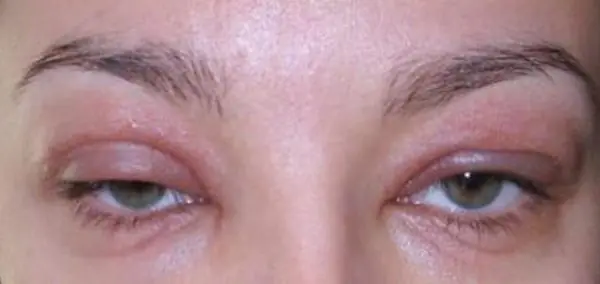
This is what swelling of the eyelids looks like during an allergic reaction.
Liver diseases
The liver is one of the most important organs involved in metabolism, so its condition clearly affects the state of the body. Swelling due to liver problems is accompanied by:
- swelling of the upper extremities;
- nausea;
- bile entering the esophagus, bitter taste in the mouth;
- clarification of urine and stool.
Less commonly, eye diseases, as well as various neck and head injuries that impair blood flow in the facial skin, can lead to swelling. If your face swells in the morning and is definitely not due to an unhealthy lifestyle, then you should immediately consult a doctor for a diagnosis. You can get rid of the swelling itself with the help of masks and other cosmetics, but the cause must be treated with medication.
Often women are dissatisfied with their face in the morning after getting up - swelling occurs, which is sometimes quite difficult to remove. In itself, swelling on the face is not life-threatening, but it may be a symptom that there is some kind of pathology in the body. Therefore, it is important to find out why the face swells in the morning: the reasons for women can be completely different, we will talk about them below.
The principle of water metabolism in the body

The body's water balance consists of three interrelated processes:
- intake of water from the external environment with liquid and food
- formation of fluid inside the body due to metabolic processes (endogenous water)
- removing excess water from the body
Edema can form when any of the three above components is disrupted and is a pathological condition. Due to increased vascular permeability, the liquid part of the blood leaks into the space between the cells, resulting in swelling.
Main reasons
There are many factors that lead to the development of edema. In some cases, the cause is a banal feast, but sometimes swelling indicates a serious pathology.
Allergy
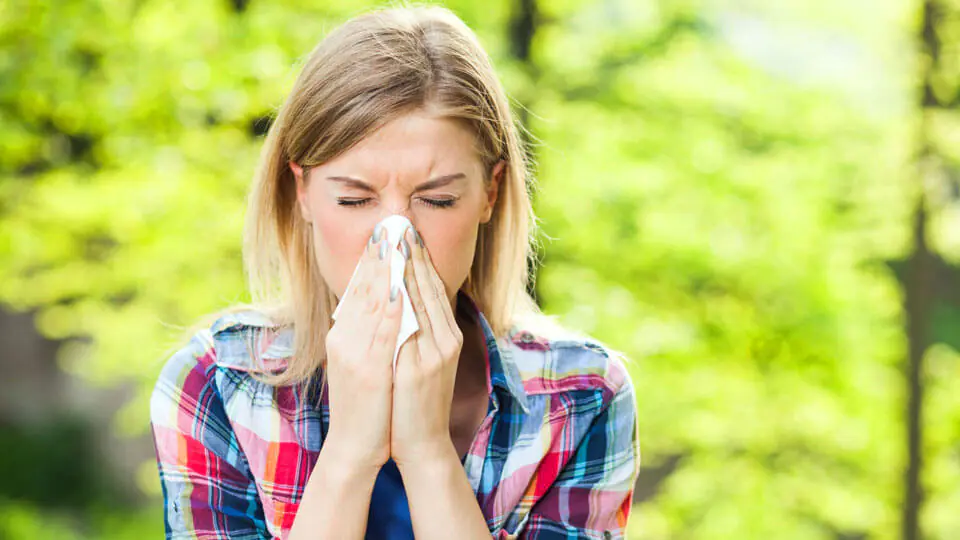
One of the manifestations of an allergic reaction may be swelling. Depending on the degree of sensitization of the body to the allergen, swelling varies. Most often, the clinic notes an enlargement of the eyelids and lips, but there is also a more serious condition when the swelling spreads to the soft tissues. The most dangerous thing is swelling of the mucous membrane of the pharynx and larynx, as this can often result in suffocation and death.
Swelling is rarely an isolated symptom of allergy; it can also manifest as itching, rhinorrhea, injection of conjunctival vessels, sneezing, and difficulty breathing. The development of symptoms occurs immediately after contact with the allergen, so it is not tied to a specific time of day.
Identifying the trigger of a hypersensitivity reaction on your own is often difficult, so it is recommended to consult a doctor and do special tests. There are cross-allergens, and their list grows throughout a person’s life, so he always needs to have antihistamines with him.
Hormonal disbalance

Often occurs in women. An imbalance of hormones leads to the fact that the patency of the vascular wall for the liquid part is disrupted. Violation of the function of one organ producing hormones entails changes in the ratio of all other biologically active substances. Hormonal imbalance can occur at any age: adolescence and menopause are considered the most critical stages. There are many reasons for the imbalance of hormones in the body, even stress and bad habits affect it.
Taking hormonal contraceptives can have a negative impact on your health, especially if they are chosen incorrectly. Artificial analogues of hormones, which a woman uses daily to protect against unwanted pregnancy, provoke fluid retention in the tissues, causing edema syndrome. Therefore, it is very important to select a drug from a competent specialist, while at the same time listening to your body.
Age-related changes
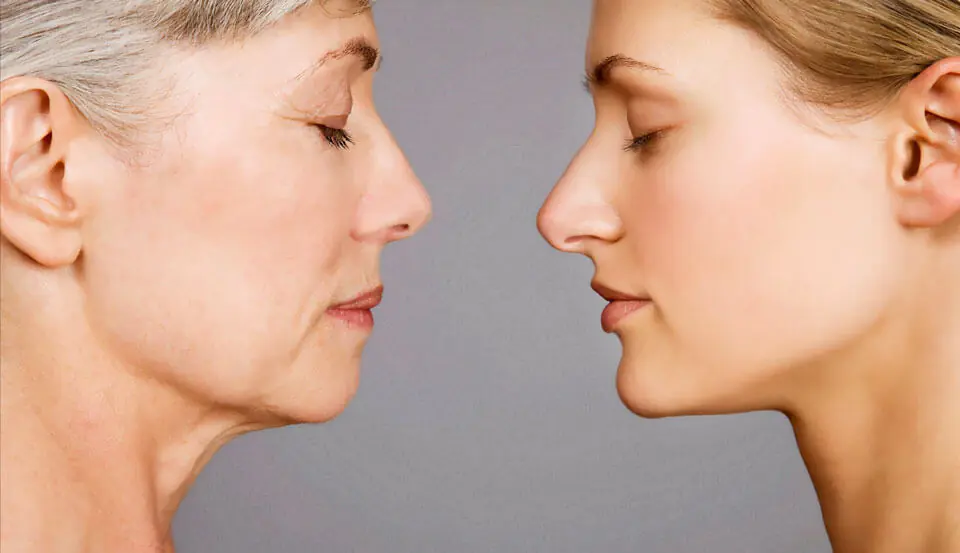
Edema often accompanies women during menopause. Their main cause is a violation of the flow of lymph in the vessels of the same name. The place where there is swelling does not change its color; swelling can appear not only in the morning, but at any time. When pressure is applied, a dimple appears in the area of edema; the tissues do not immediately return to their previous position.
Poor nutrition
The quality of the body's water environment is very dependent on the food eaten. Salt most often provokes fluid retention: it draws water along with it, and it takes time to remove it. Too spicy, smoked or sweet foods have an adverse effect on the water balance.
Don't forget about your diet. This applies more to busy people who often skip the morning meal, eat only sandwiches or fast food during the day, and overeat heavily in the evening. The body does not yet have time to digest all the food taken, and the person goes to bed. This diet can easily lead to morning swelling.
After salon treatments
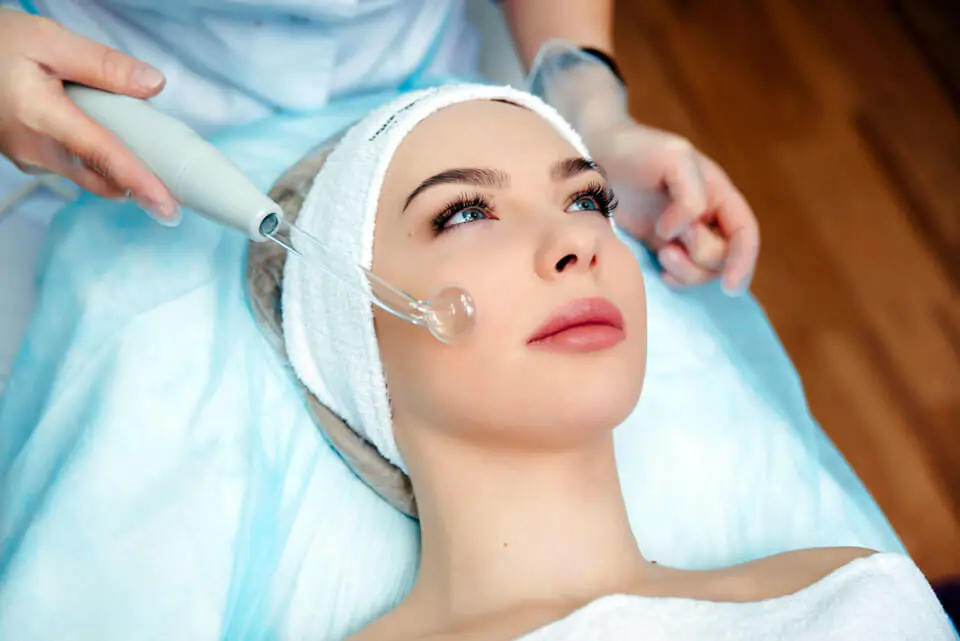
Facial care is absolutely necessary; a qualified cosmetologist can best handle this. But if some irritating substances are applied to the face or the products remain on the skin for a long time, then instead of a beautiful appearance, you can get swelling. Night cream also needs to be applied to the skin of the face wisely: excess cosmetic product must be removed, and the procedure itself must be carried out at least an hour before going to bed. It is important to use high-quality skincare products that do not contain harmful chemicals. They can clog pores, cause swelling and impair skin breathing.
Alcohol consumption
Abuse of alcoholic beverages does not add attractiveness to your appearance the next morning, not counting the load placed on the liver and kidneys. The body tries to remove excess alcohol, resulting in dehydration - liquid accumulates in the intercellular environment. Not only alcohol is a provoking factor of fluid retention: even strong tea drunk before bed can result in morning swelling on the face. The body thus stores fluid, protecting itself from dehydration in advance.
Stress and sleep disturbances

Stress, especially chronic stress, negatively affects water metabolism in the body. Frequent nervous strain causes an increase in the concentration of cortisol in the blood (an adrenal hormone), which contributes to fluid retention, among other health problems. Stress increases aldosterone levels, the main function of which is to maintain water balance.
Taking medications
Fluid may be retained under the influence of certain medications. These are most often hormonal agents containing estrogen, adrenal hormones, and thyroid hormones. Hypoglycemic drugs, as well as drugs for the treatment of hypertension, can have a similar effect.
Drink plenty of fluids before bed

It is not advisable to drink too much liquid before going to bed. This is a double load on the kidneys, which work differently at night than during the day. In addition, at night there is an active production of antidiuretic hormone: this is why a person can sleep all night and not wake up to go to the toilet. If you overdo it with the amount of liquid you drink at night, you may see swelling on your face in the morning. You need to drink a few hours before going to bed. In this case, the kidneys will have time to remove excess fluid to the outside./
Infectious diseases
The development of infections is accompanied by an inflammatory reaction. Swelling is one of the five external signs of inflammation, so it can be observed at the site of infection. The main method of combating it is to treat the disease that caused the swelling.
Liver and kidney diseases
Most often, edema is associated with kidney disease. This is logical, because it is this paired organ that is responsible for removing unnecessary fluid from the body. If the kidneys for some reason do not fully perform their function, this may manifest itself as edema. They appear in the morning and are localized in the area of the eyes and eyelids, distributed unevenly throughout the tissues.
The swelling subsides slowly, may disappear in the evening, but returns in the morning. It is important not to miss a serious pathology of the kidneys, therefore, with constant morning swelling, it is necessary to pay attention to the nature of urination, color, amount of urine, pain when urinating. In case of any deviations, you should definitely see a specialist.
Liver diseases are also fraught with the development of edema syndrome. This organ performs a protein-synthesizing function, producing albumin. These proteins are the basis of the oncotic pressure of the blood, when it decreases, widespread edema will form due to a lack of albumin.
Thyroid diseases

Insufficient production of thyroid hormones (disease - hypothyroidism) can manifest itself as swelling, which is located mainly on the face, neck and legs. This pathology has few symptoms for a long time, but the lack of thyroid hormones negatively affects the functioning of the entire body.
Cardiovascular diseases
A characteristic symptom of heart failure is swelling. They first appear on the lower extremities and intensify in the evening, but in severe cases the swelling spreads to the face. Swelling of the legs does not pose a threat to human life; it is dangerous when fluid accumulates in vital organs, such as the lungs or abdominal cavity.
Metabolic disorders
Any metabolic disorder causes a cascade of reactions, and the manifestations will be varied. Edema due to water-electrolyte imbalance as a symptom is no exception.
Hypertension
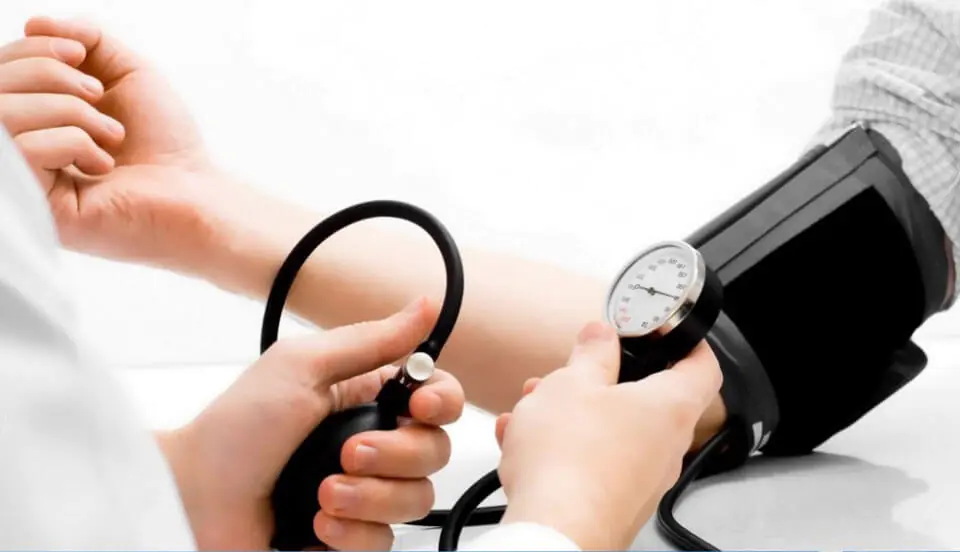
Swelling due to arterial hypertension can be localized anywhere, but more often on the face and legs. With constantly elevated pressure, the heart cannot cope with such a load over time, so heart failure develops. Blood stagnates in the venous vessels, and the liquid part seeps through the wall into the intercellular tissue. Due to the fact that oxygen-enriched blood is not enough to properly nourish the organs, the phenomena of ischemia and tissue hypoxia occur. If increased pressure affects the kidneys, they begin to intensively excrete protein, thereby reducing oncotic pressure.
Thrombosis
Swelling of the lower extremities often speaks in favor of venous thrombosis. Due to the fact that venous fluid cannot return back to the heart, the liquid medium gradually penetrates into the intercellular fluid and edema forms. This condition requires urgent medical attention as it progresses inexorably.
Postoperative period
Swelling on the face occurs after surgical interventions. This may be tooth extraction, which inevitably causes trauma to the soft tissues of the oral cavity. If there are no complications, the swelling will go away on its own within a couple of days after the procedure. You should be concerned if, along with swelling, there is severe pain, an increase in temperature and a deterioration in general well-being.
When performing manipulations on facial tissues, the occurrence of swelling after the intervention is common. This is a natural reaction of the body to external invasion. The severity of swelling depends on what kind of surgery was performed and how deeply the tissue was damaged. Individual characteristics also influence: for some, swelling may be almost unnoticeable, while others walk with severe swelling for a long time. The swelling becomes maximum on the second or third day, after which it begins to slowly subside.
Swelling during pregnancy

Swelling during pregnancy is a very common complaint. During pregnancy, the amount of fluid that circulates through the vessels almost doubles. This fluid is contained in the baby's amniotic fluid, the placenta, and is necessary for the full growth and development of the fetus in the womb. The mother's water-salt metabolism also undergoes changes: the amount of sodium increases, which subsequently retains fluid.
As pregnancy progresses, the uterus grows and puts pressure on lymphatic and other vessels and tissues. The return flow of fluid to the heart slows down, which is why edema appears, especially in recent months. Edema in some cases may not threaten the health of the mother and child, but sometimes they pose a serious danger. Due to excessive tissue swelling, hypoxia occurs in both the mother and the fetus, all organs and systems suffer from this.
Gestosis in pregnant women is also accompanied by edema, so you need to be able to differentiate minor disorders from those that require serious correction of the condition. In case of severe gestosis, doctors may decide to terminate the pregnancy early.
Remedies
Edema can and should be fought. The reason that caused them plays a huge role: if possible, it must be eliminated (for example, stop eating too salty foods or not drinking alcoholic beverages). There are also other methods to eliminate swelling.
Salon treatments
In order to eliminate swelling on the face, modern procedures have been developed, which are carried out in beauty salons by specially trained people. Before using them, you should definitely consult with a cosmetologist in the salon, who will identify possible contraindications to these procedures.
At the moment, the following methods have proven effectiveness and are in high demand:
- Mesotherapy – special preparations are injected into the skin to saturate the skin with vitamins and other beneficial substances. Metabolism improves, so the removal of excess fluid improves. Facial swelling is eliminated. To obtain a visible and long-lasting effect, one procedure is not enough: you need to visit the salon once a week, and the duration of the course is determined by the doctor (several months).
- Cryolifting is a rejuvenation technique. The skin is briefly exposed to extremely low temperatures. The effect of the procedure is noticeable almost immediately and lasts for a long time, which is why it is popular.
- Wraps and mud masks. With these procedures, the skin becomes more elastic and smooth. When wrapping, a person warms up and sweats, excess liquid is removed.
Diuretics
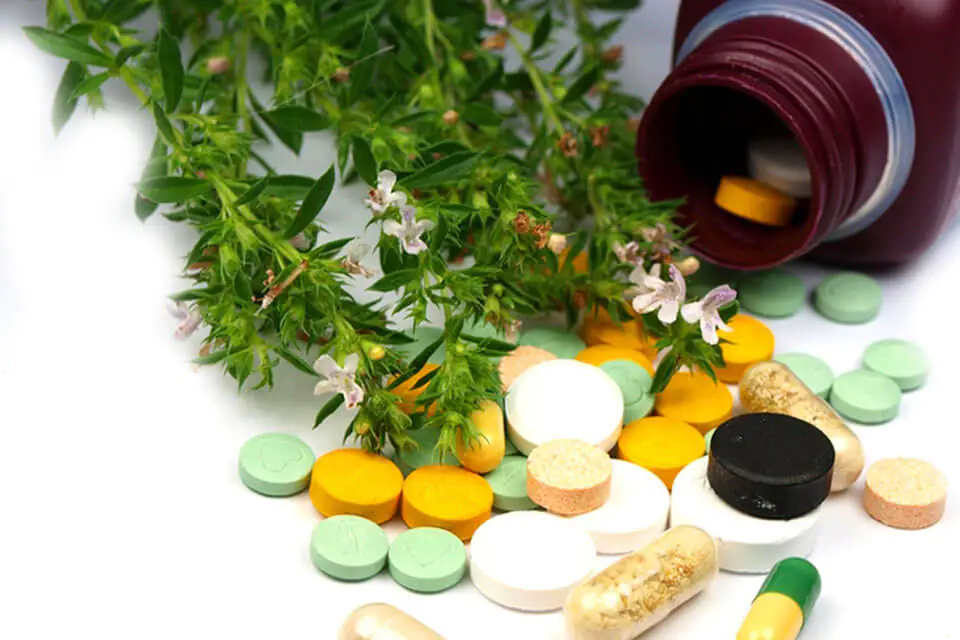
The use of any medications is advisable only after consulting a doctor. Diuretics are indicated only in cases where swelling affects the patient’s quality of life and health:
- Swelling on the face does not go away within a few days and tends to spread.
- Swelling leads to the fact that the palpebral fissure decreases in size, which is why vision is impaired. In severe cases, this can result in displacement of the eyeball.
It is important to understand that diuretics are only a temporary measure: they can remove the external manifestations of swelling, but they cannot cope with its cause. Therefore, after stopping diuretics, there is a high probability that they will occur again. They also have many side effects, among which the most common are water-electrolyte imbalance and loss of ions (potassium, calcium and others).
Masks
On store shelves there is a huge selection of masks to eliminate puffiness on the face. By providing a local effect, they can quickly cope with swelling, in addition to toning the skin and giving it a healthy and rested appearance. Face masks can also be made at home from natural ingredients.
Recipes for some of them:
- Potato mask. You can use both raw and cooked root vegetables. To prepare a hot mask, you need to boil the potatoes, mash them and apply them to your face. Keep the potatoes on your face for no more than 15 minutes, after which you need to rinse with warm running water. When making a mask from raw potatoes, you need to grate them into a paste.
- Pumpkin. To do this, boil the pumpkin until mushy, and add just a little honey (half a teaspoon). The resulting mass should be placed on gauze and applied to the swollen area for 20 minutes.
- Cucumber-lemon. This mask effectively fights morning puffiness, giving the skin a rested and well-groomed look. Grind the cucumber using a blender and add a tablespoon of lemon juice. Apply this mixture to your face in the morning, and after 20 minutes, rinse with warm running water.
Massage

In youth, to eliminate morning puffiness, you only need a little time, a light facial massage or applying a moisturizer. But at an older age (after 35 years) you need a professional massage using cosmetics, which can speed up metabolism and collagen synthesis in the facial skin.
At a young age, a light massage and the use of moisturizers are usually enough to make the swelling disappear. Over time, a more professional massage will be required using special techniques and aids, which will accelerate metabolism and collagen synthesis in tissues.
Lymphatic drainage facial massage shows good effectiveness. The movements are directed along the lymphatic vessels, as a result of which its outflow from the tissues improves. The result is noticeable even after the first session, and a course of massage helps get rid of unhealthy complexion and fine wrinkles. With edema, the fluid in the vessels stagnates, and harmful substances accumulate in it.
By restoring normal circulation, the elimination of toxins is improved, resulting in a fresher appearance. The duration of one session should not exceed 10 minutes, and the course consists of approximately 10 techniques. You definitely need to listen to your body and avoid excessive tension on the skin, which is especially delicate around the eyes.
Compresses
If the cause of swelling lies in a late-night feast or drinking heavily before bed, then you can eliminate it with the help of compresses. Funds for them can be found in every home.
- You can wipe your face with an ice cube. To do this, you need to freeze plain water or a decoction of chamomile, sage or plantain in the evening. These herbs have an anti-inflammatory effect and relieve swelling.
- Contrast compresses give excellent results, relieving a woman of swelling. A napkin or gauze soaked in hot water and then in cold water is applied to the face. The napkins need to be changed several times (5-6).
- Compresses with a tea bag. You need to first brew the tea in hot water, after which the bag is sent to the freezer to cool for a few minutes. Apply to swollen areas before heating.
When to see a doctor

The help of a specialist is required in cases where swelling on the face is caused by pathology. You need to pay attention to the frequency of edema, because if it appears every morning, then this is not a good signal. It doesn’t hurt to track what causes the swelling, because if you started taking it after taking certain medications, then maybe they are not suitable for treatment and you need to tell your doctor about these side effects.
Morning swelling in women can be either a harmless manifestation of a short-term imbalance in water balance or one of the symptoms of a serious illness. Only a doctor will be able to distinguish between these concepts and prescribe the correct treatment to eliminate edema due to pathology.
Video: 11 signs of health problems written all over your face

Content:
What is facial swelling
If your face swells in the morning, but it goes away after a short time, there is no serious cause for concern. This may be a result of pressure on your face while sleeping if you like to sleep with your face in your pillow. But if not, then first you need to understand the physiology of this unpleasant phenomenon.
Edema is an increase or stretching of tissue due to the accumulation of fluid or inflammation. It can occur anywhere on the face, but is most common on the lips, cheeks and eyelids, and can also spread to the neck area.
During sleep, fluid is redistributed. Usually most of it is concentrated in the lower half of the body, pulled down by gravity. But in a lying position, it is evenly distributed throughout the body, which is the most common cause of facial swelling in women in the morning. The effect disappears an hour after it occurs.
Orbiting astronauts have a perpetually swollen face due to the lack of gravity pulling fluids toward their legs while they are “hanging.” As a result, while in space, they lose most of the wrinkles on their faces.
Other physiological causes include:
- Water retention: The most common cause of this problem is fluid retention. The best way to avoid this is to limit your alcohol and salt (sodium) intake and, as counterintuitive as it may sound, drink more water (throughout the day) to flush your system.
- Allergic reactions. Another common cause of puffiness in the morning is an allergic reaction. Check for possible allergens, including allergies to the feathers in the pillow or the material of the pillowcase, by replacing them for a few days.
- Lotions and creams: It is also common for sensitive skin to react to lotions or creams applied to the face before bed. Stop using all products for a few days to see if the swelling goes away. Steroid creams are especially likely to cause swelling.
- Cushion height: Sometimes swelling is caused by the level of the pillow during sleep, which causes either pressure or water retention. Try to sleep with two pillows so that the fluid drains properly and does not settle in the head and neck area. If it hurts or causes discomfort, try an orthopedic pillow.

More about the reasons
Fortunately, the most common causes do not require specialized treatment and are our body’s reaction to certain factors, by eliminating which we will get rid of swelling. And in some cases, swelling goes away without any intervention. The most common of these reasons include:
Allergy
Dust, animal hair, plant pollen - all this endlessly swirls in the air and can lead to an allergic reaction. In addition to the usual sneezing and watery eyes, allergens can also lead to so-called facial allergies. Symptoms include puffy eyes, flaking skin, swelling and chapped lips from mouth breathing.
Sinusitis
Sinusitis is inflammation and swelling of the sinuses, which become blocked and filled with fluid during a cold. As a result, pressure develops in this area, accompanied by a dull ache around the eyes, greenish-yellow nasal discharge, severe headaches and swelling of the face.
Focus on rest, drink plenty of fluids and take an antihistamine and everything will go away on its own.
Abscessed tooth
An abscess (aka infection) causes pus to accumulate and become swollen around the tooth or gums. Accompanied by toothache and swelling of the face in the area of the diseased tooth.
At home, an abscess is treated with compresses and anti-inflammatory drugs. However, you should consider seeing a dentist as the abscess will need to be drained and oral antibiotics will also need to be taken.
Subsequent treatment will eliminate both the toothache and the swollen cheek.
Hot shower
There's nothing more relaxing than standing in a steamy shower. But too hot water is actually not that good, and after such a shower you may find that your face (and not only) has increased in size. Hot water steams and relaxes the skin and muscles.
Too much drinking
We all know that drinking too much alcohol dehydrates the body, which is what makes hangovers so bad. But dehydration in turn leads to fluid retention, and the next morning you will wake up not only with a sore head, but also with a swollen face.

Too much salty
If you spend the evening lying in bed with a large bag of chips, you may wake up the next morning with severe swelling. Excessive salt content can cause the body to retain more fluid in an attempt to dilute the salt, causing the face to appear more puffy than usual.
PMS (premenstrual syndrome) sometimes causes fluid retention in the body, which, as we know, can also lead to swelling.
Allergy to pillows
Blankets and pillows are another cause of morning swelling. Feather pillows or a duvet can be a real allergen, especially for women. Agree, it’s not pleasant to wake up in the morning with a swollen face, even if you really love your bedding.
Sunburn
Yes, it is possible to get a sunburn even if you don't feel it. And this can cause not only redness, but also swelling in some cases. For this reason, it is necessary to use sunscreen daily.
Barley
This is a painful inflammation on the edge of the eyelid. It can be external or internal, and can often cause swelling of the area around the eyes. You can treat the sore spot with chloromycetin, but after a maximum of 7 days it will break through and the swelling will go away.
Reactions to medications
Facial swelling may occur as an allergic reaction to certain medications, such as penicillin or aspirin. If you suspect an allergic reaction, you should consult your doctor as soon as possible about allergy injections or oral antihistamines.
If your face swells and does not go away
But why does the face swell and the swelling does not subside? If the swollen face continues to increase and causes severe pain, or if it is accompanied by other symptoms, you should see a doctor immediately, as it may be a symptom of a more serious condition:
Angioedema
Angioedema is an excessive accumulation of body fluids in the skin, caused in many cases by an allergic reaction. As a rule, it occurs together with urticaria. The most common locations are the area around the eyes, lips and face, but it can also appear in other parts of the body, and even in the throat. In particularly difficult cases, immediate treatment with adrenaline is required.
Angioedema can be caused by an allergic reaction to:
Dermatomyositis
Dermatomyositis is an autoimmune disease in which the skin and skeletal muscles are infiltrated predominantly by lymphocytes. Although it is an idiopathic disease, it may result from an interaction between the patient's genetic background (determining the immune system response) and the viral pathogen. One of the symptoms is bilateral facial swelling.
Malnutrition (severe) or obesity
In both cases, facial swelling is a disruption of body functions.
Skin infections
A bacterial skin infection causes the face or other area of the body to swell and become inflamed, red, and hot to the touch. If you experience these symptoms—and especially if the swelling spreads—go to the emergency room. With timely treatment, only a week's course of antibiotics is needed, but without treatment, deaths are common.

Piggy
Other symptoms in addition to a puffy scalp include headache, fever, and muscle pain. Most cases resolve within a few weeks as the illness subsides.
Thyroid
The thyroid gland produces a hormone that regulates metabolism and body temperature. If for some reason not enough hormones are produced, metabolic changes can lead to enlargement of the subcutaneous tissue.
Symptoms that accompany this condition include increased feeling of cold, weakness, dry skin and irregular menstruation.
Conjunctivitis
If the swelling is concentrated around the eye area, it's likely conjunctivitis, a nasty infection or inflammation of the membrane lining the eyelids.
Most causes of conjunctivitis are related to viruses, but there are also cases of allergies. In addition, there are also bacterial conjunctivitis or even caused by contact lenses. In addition to swelling, there may be redness, watery eyes, or itching. Viral conjunctivitis is usually treated with supportive care, which includes cool compresses. Bacterial conjunctivitis requires antibiotic eye drops.
Rosacea
If you have rosacea, certain triggers can cause a flare-up. Hot weather, spicy foods, alcohol, and even emotional stress can lead to facial flushing, burning, and even swelling.
A gentle cleanser and moisturizer and daily use of sunscreen will help control symptoms.
Are you taking steroids?
A puffy face may be the result of taking prescribed steroids—and higher doses may lead to more significant side effects. In this case, you should discuss with your doctor the possibility of reducing the dose.
Cushing's syndrome
Yes, cortisol is a stress hormone, but it also helps regulate blood pressure, blood sugar and a variety of other processes. But when too much of it is pumped out by the adrenal glands, it can lead to Cushing's syndrome, a disease characterized by a round, puffy face, easily vulnerable skin, and increased body hair.
Cushing's disease affects women nearly three times more often than men and often occurs in people who have been treated with glucocorticoids.
If left untreated, Cushing's syndrome can lead to heart attack, stroke, and type 2 diabetes.
Lung cancer causes swelling of the face and neck when the cancer presses on a vein that runs from the head to the heart. This symptom is called superior vena cava syndrome or superior vena cava obstruction.
The superior vena cava is a vein that carries blood from the head and arms to the heart and runs near the top of the right lung and the lymph nodes in the chest cavity. Tumors in or around the lungs or lymph nodes can block normal blood flow, leading to obstruction.
Besides lung cancer, other cancers that lead to superior vena cava obstruction include:
- mammary cancer,
- lymphoma,
- thyroid cancer,
- thymus tumor.
This condition can also be caused by other non-cancerous diseases:
- tuberculosis,
- inflammation of the vein (thrombophlebitis),
- fungal infection such as histoplasmosis,
- aortic aneurysm (swelling of the main artery that carries blood from the heart to the body),
- blood clots in the superior vena cava,
- enlargement of the thyroid gland,
- constrictive pericarditis (inflammation of the membrane surrounding the heart),
- side effect of radiation therapy in the chest cavity.
Symptoms of superior vena cava obstruction may develop quickly or gradually. Early symptoms include swelling around the eyes or face, especially in the morning. Common symptoms of superior vena cava obstruction include shortness of breath and swelling of the face, neck, arms, or torso. Sometimes, superior vena cava obstruction can also cause dizziness, visual disturbances, fainting, and redness of the face, palms, or mucous membranes. The condition requires immediate medical attention.
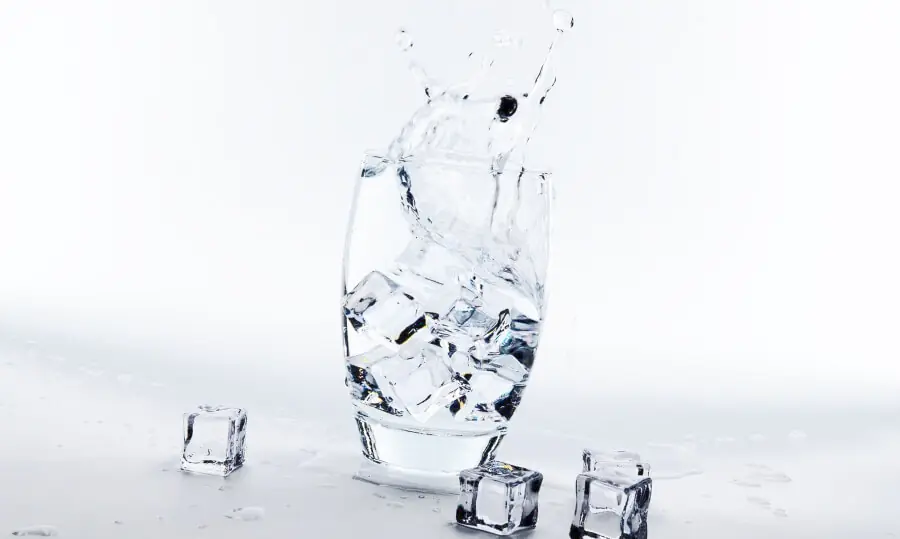
What to do
What to do? If swelling is not a symptom of the disease and, as a rule, goes away after half an hour, you can start following simple rules that will give excellent results in a very short time:
- The idea that drinking water can lead to a bloated face is a myth. In fact, everything is exactly the opposite - insufficient water consumption can lead to swelling of the face. Dehydration causes blood vessels to dilate, which in turn promotes water retention, especially in the facial area.
High salt content in the body retains water, which also causes swelling. Avoid carbonated drinks and always monitor the salt levels in your food.
Never underestimate the power of a good massage to help de-puff your face. Lubricate your face with moisturizing or massage oil and massage lightly. This process will help push excess fluid to the lymph nodes in the neck.
The first and main rule is not to drink anything after 9 pm. If you feel very thirsty, suck on ice or take a couple of sips of kefir. The fact is that the liquid you drink before going to bed manifests itself in the form of swelling on the face in the morning.
Moisturizing face masks bring tangible benefits to health and appearance, leaving the skin soft and velvety. But never make such masks at night. Excessive skin hydration can cause swelling.
Do swelling on your face appear every morning? Take diuretics. If you choose store-bought ones, first consult your doctor, as these drugs have contraindications. But you can use natural products that remove fluid from the body well. These include: watermelons, green tea, cucumbers. These products will not only rid you of excess fluid in the body, but will also cleanse it of toxins and waste.
Pay attention to the patches - overlays for the area under the eyes, soaked in special useful products. Choose a decongestant option. Such devices have a lymphatic drainage effect and can relieve you of swelling for a long time.
Stop drinking coffee or reduce the amount you drink to a minimum. The fact is that this invigorating and, for many, tasty drink removes a special fluid from the body, which maintains the normal balance of moisture in the body. Replace coffee with green tea; this drink is also unusually aromatic and has a unique pleasant taste. And, of course, never drink coffee before bed.
To always look charming, drink as much water as your body requires. You don’t need to endure thirst, but you shouldn’t pour excess liquid into yourself either. Listen to the desires of your body, take care of your health, eat natural and healthy foods, and your beauty will be perfect.
Prevention
Despite the fact that the causes of swelling are different and the methods for treating them are also different, preventive measures in many cases are the same:
- Physical activity helps to “squeeze” excess fluid out of the body.
- Include healthy “anti-edematous” foods in your diet: apples, cottage cheese, tea with lemon; In case of food allergies, you need to follow a diet.
- Limit your salt intake.
- To avoid facial swelling, it is recommended to sleep on your back: sleeping on your stomach often leads to baggy lower eyelids.



